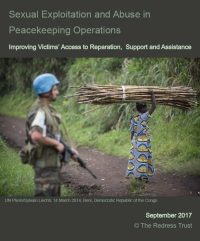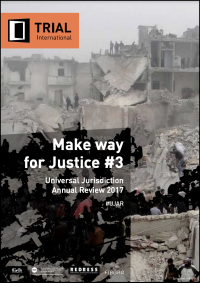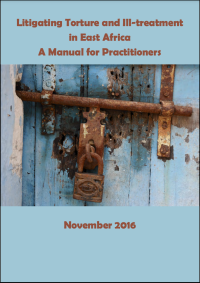Publications
REDRESS’ publications are also available in hard copy format. Please contact us for further information on [email protected].
This report, co-authored by REDRESS and Avocats Sans Frontières (ASF), summarises the proceedings of a workshop on victim and witness protection at the International Crimes Division (ICD), the first domestic court in Uganda to try international crimes. Participants included ICD judges, registrar, prosecutors, and victims’ counsel, alongside national and international experts, who discussed which measures can be put in place to ensure the safety and well-being of victims and witnesses throughout the process despite the lack of protection laws and national protection mechanism.
Ce rapport a été rédigé par The Redress Trust (REDRESS) avec la contribution de la Fédération Internationale des ligues des Droits de l’Homme (FIDH), la Ligue Centrafricaine des Droits de l ‘Homme (LCDH) et l’Observatoire Centrafricain des Droits de l’Homme (OCDH) (ci-après les Organisations). Ce rapport présente une analyse de la conformité des règles de procédure pénale centrafricaines aux standards internationaux sur les droits des victimes et formule des recommandations sur la façon dont le Règlement de Procédure et de Preuve (RPP) pourrait combler certaines lacunes. Le rapport vise à identifier comment les droits des victimes pourraient être pris en compte de façon adéquate par le projet de RPP, sur la base des dispositions existantes en droit centrafricain ainsi que des standards internationaux.
This report analyses the steps taken by specialist bodies, UN organs and agencies as well as other international organisations engaged in peacekeeping to address victims' rights and needs following allegations of sexual exploitation and abuse by peacekeepers in countries including the Central African Republic, the Democratic Republic of the Congo and Haiti. It calls for fundamental changes to the way in which these cases are handled, with particular need for the recognition of victims right holders, rather than vulnerable recipients of charity or benevolence.
The African Union adopted a resolution in 2016 establishing the Trust Fund responsible for collecting and disbursing reparations to victims of ex-Chad dictator Hissène Habré. The Trust Fund has been mandated to search for and recover Habré’s assets and to seek voluntary contributions from States and other willing parties. This note – prepared by REDRESS and the Association Tchadienne pour la Paix et les Droits de l’Homme (ATPDH) – seeks to support the establishment of the Trust Fund for Victims by outlining what future Terms of Reference of the Trust Fund could look like. It was shared with the African Union Office of Legal Affairs and other key stakeholders involved in the establishment of the Trust Fund in April 2016.
This report, co-authored by REDRESS, TRIAL International, the International Federation for Human Rights (FIDH), the European Centre for Constitutional and Human Rights (ECCHR), and The International Foundation Baltasar Garzón (FIBGAR), looks back on the unprecedented momentum of Universal Jurisdiction in 2016. In 47 cases across 13 States, States implemented Universal Jurisdiction in order to prosecute criminals regardless of their nationality or where the crime was committed, proving the doctrine to be a significant practical tool against impunity in Syria, Rwanda, Nepal, Guatemala, Iraq, and elsewhere. REDRESS calls upon domestic jurisdictions around the globe to seize this growing opportunity to bring justice to the perpetrators of crimes against humanity, war crimes, and torture.
Authored in collaboration with Barbara Maigari (JI Fellow) Partners West Africa-Nigeria and Legal Resources Consortium, this Commentary considers the challenges and opportunities present in the adoption of a comprehensive anti-torture bill in Nigeria, and offers concrete recommendations for its introduction to relevant stakeholders. Relying on interviews with national experts, a comprehensive literature review, and several consultative meetings, this report briefly outlines the practice of torture and ill-treatment in the Nigeria, and identifies shortcomings in the existing legal framework that need to be addressed in accordance with the country’s international obligations.
This report summarises the proceedings of the stakeholder roundtable organised by the Human Rights Center at the University of California, the International Center for Transitional Justice (ICTJ) and REDRESS, to assess how to best incorporate techniques of victim participation at the ICC and other comparative jurisdictions into the workings of Uganda's International Crimes Division (ICD). The ICD is the first domestic judicial body in Uganda to try international crimes, in particular war crimes, crimes against humanity, and genocide. Participants were made up of relevant actors of the ICD, experts on the implementation of victims’ rights at the ICC, and those working on the domestic implementation of victims’ rights in the United States and Kenya.
This manual seeks to assist those working to fight torture and to support victims through litigation in six countries in East Africa: Burundi, Kenya, Rwanda, South Sudan, Uganda and Tanzania. This region boasts a vibrant and active civil society that has advocated for the introduction of specific anti-torture legislation to create opportunities for litigation at domestic, regional, and international levels. Meanwhile, national lawyers have continued to use existing avenues to litigate against torture to secure accountability and justice for victims. This manual seeks to build on those efforts to offer a practical guide to the continuing development of a range of avenues for victims of torture and ill-treatment to obtain redress.



